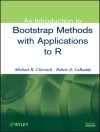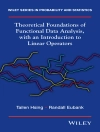Managing uncertainties in industrial systems is a daily challenge
to ensure improved design, robust operation, accountable
performance and responsive risk control. Authored by a leading
European network of experts representing a cross section of
industries, Uncertainty in Industrial Practice aims to provide a
reference for the dissemination of uncertainty treatment in any
type of industry. It is concerned with the quantification of
uncertainties in the presence of data, model(s) and knowledge about
the system, and offers a technical contribution to decision-making
processes whilst acknowledging industrial constraints. The approach
presented can be applied to a range of different business contexts,
from research or early design through to certification or
in-service processes. The authors aim to foster optimal trade-offs
between literature-referenced methodologies and the simplified
approaches often inevitable in practice, owing to data, time or
budget limitations of technical decision-makers.
Uncertainty in Industrial Practice:
* Features recent uncertainty case studies carried out in the
nuclear, air & space, oil, mechanical and civil engineering
industries set in a common methodological framework.
* Presents methods for organizing and treating uncertainties in a
generic and prioritized perspective.
* Illustrates practical difficulties and solutions encountered
according to the level of complexity, information available and
regulatory and financial constraints.
* Discusses best practice in uncertainty modeling, propagation
and sensitivity analysis through a variety of statistical and
numerical methods.
* Reviews recent standards, references and available software,
providing an essential resource for engineers and risk analysts in
a wide variety of industries.
This book provides a guide to dealing with quantitative
uncertainty in engineering and modelling and is aimed at
practitioners, including risk-industry regulators and academics
wishing to develop industry-realistic methodologies.
Tabla de materias
Preface.
Contributors and Acknowledgements.
Introduction.
Notation – Acronyms and abbreviations.
Part I: Common Methodological Framework.
1. Introducing the common methodological framework.
2. Positing of the case studies.
Part II: Case Studies.
3. CO2 emissions: estimating uncertainties inpractice for power plants.
4. Hydrocarbon exploration: decision-support through uncertaintytreatment.
5. Determination of the risk due to personal electronic devices(PEDs) carried out on radio-navigation systems aboard aircraft.
6. Safety assessment of a radioactive high-level wasterepository – comparison of dose and peak dose.
7. A cash flow statistical model for airframe accessorymaintenance contracts.
8. Uncertainty and reliability study of a creep law to assessthe fuel cladding behaviour of PWR spent fuel assemblies duringinterim dry storage.
9. Radiological protection and maintenance.
10. Partial safety factors to deal with uncertainties in slopestability of river dykes.
11. Probabilistic assessment of fatigue life.
12. Reliability modelling in early design stages using the Dempster-Shafer theory of Evidence.
Part III: Methodological Review and Recommendations.
13. What does uncertainty management mean in an industrialcontext?
14. Uncertainty settings and natures uncertainty.
15. Overall approach.
16. Uncertainty modelling methods.
17. Uncertainty propagation methods.
18. Sensitivity analysis methods.
19. Presentation in a deterministic format.
20. Recommendations the overall process in practice.
Conclusion.
Appendices.
Appendix A. A selection of codes and standards.
Appendix B. A selection of tools and websites.
Appendix C. Towards non-probabilistic settings: promises andindustrial challenges.
Index.
Sobre el autor
Editors: Etienne de Rocquigny, Electricite de France, R&D (Senior Research Fellow).
Nicolas Devictor, Commissariat a l’Energie Atomique.
Stefano Tarantola, J.R.C. Ispra.
Authors: The 10 members of the Uncertainty Project Group, part of ESRe DA: European Safety, Reliability and Data Association.












